 In the many decades since gay stories have been honestly depicted on the big screen, there are still just a handful of films that can be thought of as transformative viewing experiences, which caused viewers to reflect and change their lives. Among them are The Boys in the Band in 1970, Paris Is Burning in 1990, Brokeback Mountain in 2005, and for many queer people the 1991 documentary Truth or Dare is firmly entrenched in that short list. Director Alek Keshishian’s behind-the-scenes look at Madonna during her wildly successful and chaotic Blond Ambition tour offered the superstars legion of fans an unvarnished peek at her singular version of celebrity and became not only one of the most vivid concerts films ever made, but also the most successful documentary released up to that time, grossing nearly $30 million. Even more provocative to the entertainer’s legion of queer fans was the intimate, yet matter-of-fact glimpse into the lives of her seven backup dancers (six of whom were gay) who became a surrogate family as they trotted around the globe Keshishian’s camera offered. Perhaps Warren Beatty, who was dating Madonna at the time, summed up the atmosphere most expertly with his famous commentary “what point is there existing if it’s off camera.” Madonna didn’t censor her behavior, of course, and neither did her dancers, who queened out, made out and showed off in front of the ever-present cameras. The plum directorial assignment had landed in the lap of the then-24-year-old Keshishian after Madge had seen an innovative pop opera adaptation of Wuthering Heights, that used her music and songs by Billy Idol and Kate Bush to propel the story along, he made while still a student at Harvard. He was soon flying first class around the globe recording Madge’s every fascinating move. Now approaching its 25th anniversary, Truth or Dare will be screened July 13 during L.A.’s Outfest as part of its Legacy Project, which preserves films that offer indelible images of LGBT people. Queerty chatted with Keshishian about how Madonna chose him to make the film, the chaos of shooting the life of a superstar and their relationship today.
In the many decades since gay stories have been honestly depicted on the big screen, there are still just a handful of films that can be thought of as transformative viewing experiences, which caused viewers to reflect and change their lives. Among them are The Boys in the Band in 1970, Paris Is Burning in 1990, Brokeback Mountain in 2005, and for many queer people the 1991 documentary Truth or Dare is firmly entrenched in that short list. Director Alek Keshishian’s behind-the-scenes look at Madonna during her wildly successful and chaotic Blond Ambition tour offered the superstars legion of fans an unvarnished peek at her singular version of celebrity and became not only one of the most vivid concerts films ever made, but also the most successful documentary released up to that time, grossing nearly $30 million. Even more provocative to the entertainer’s legion of queer fans was the intimate, yet matter-of-fact glimpse into the lives of her seven backup dancers (six of whom were gay) who became a surrogate family as they trotted around the globe Keshishian’s camera offered. Perhaps Warren Beatty, who was dating Madonna at the time, summed up the atmosphere most expertly with his famous commentary “what point is there existing if it’s off camera.” Madonna didn’t censor her behavior, of course, and neither did her dancers, who queened out, made out and showed off in front of the ever-present cameras. The plum directorial assignment had landed in the lap of the then-24-year-old Keshishian after Madge had seen an innovative pop opera adaptation of Wuthering Heights, that used her music and songs by Billy Idol and Kate Bush to propel the story along, he made while still a student at Harvard. He was soon flying first class around the globe recording Madge’s every fascinating move. Now approaching its 25th anniversary, Truth or Dare will be screened July 13 during L.A.’s Outfest as part of its Legacy Project, which preserves films that offer indelible images of LGBT people. Queerty chatted with Keshishian about how Madonna chose him to make the film, the chaos of shooting the life of a superstar and their relationship today.
Queerty: When you were making the film you surely knew that it would become part of the national conversation at the time due to Madonna’s popularity, but did you know you’d be discussing it 25 years later?
Alek Keshishian: I didn’t really. It never started out to be a feature film. It was just going to be an HBO special. After we went to Japan, when I realized it could be more, everyone around Madonna was telling her, “Don’t be crazy. Look at what happened with Rattle and Hum [an ill-fated documentary about U2]” and how it didn’t make money. She decided to go with my opinion, rather than the others. It was so bad at one point that our distributor New Line who, when they found out the film was in black and white, even though I’d told them 30 times, decided to drop the film. That’s how unknown a concept it was at the time. When the phenomenon happened, it took us all by surprise.

So you had no idea that the film would have such cultural impact?
How about we take this to the next level?
Our newsletter is like a refreshing cocktail (or mocktail) of LGBTQ+ entertainment and pop culture, served up with a side of eye-candy.
No. This movie casts a very big shadow to get out of. Although now it’s interesting that I’ll see younger people and they’ll say, “I loved your movie.” I’ll ask if they mean Truth or Dare and they say, “No, With Honors [his 1994 comedy-drama].” Then there are a lot of young people who don’t even know what Truth or Dare was so that’s definitely receding.
You only had a few music videos on your resume in 1990. How did you earn Madonna’s trust for such a massive, personal project?
I don’t know. She just saw the opera I did in which I used some of her music and was surprised by her emotions and reaction to it. It was a very bad video. [Laughs] My parents had taped it. I was almost embarrassed to show it to her. She said to me, “If there’s anything I can do to help you with this, let me know.” Unbeknownst to me, she told her agents, “I want to see everything this kid does.” I didn’t realize that until long after the film was shot. I was staying with her in her apartment in New York and in her library there were individual VHS tapes of all my music videos. She hadn’t gotten a compilation, she’d gotten them one at a time right after they were made. She said, “You shoot dance better than anybody.”
 So she called you up and offered you the job?
So she called you up and offered you the job?
When she called me initially, it was still an HBO special. She said this show is going to be a real big spectacle and I want you to get some backstage stuff from Japan because it’s a really interesting place. Literally, four days later I was on a plane to Japan. It was so heavy.
Did you two develop an immediate rapport?
We did. That was the first time I’d ever flown first class and she put me next to her. I didn’t even know what was going on, but she started ribbing me pointedly. It was that friendly insult-teasing mode, which I love, but at first I didn’t know what to do because she was technically my boss. Then I thought, You know what? Fuck it. Five days ago I wasn’t working for her and I had a perfectly fine career. In fact, I was supposed to be directing the music video for a brand-new artist named Mariah Carey when Madonna stole me. So, anyway, I started playing back and by the time we landed in Japan she definitely felt like an old friend. It was a very quick soul connection.
Talk about bizarre. When I left Harvard my roommates asked if we were all coming back for the five year reunion and I said, “No, I’ll be back in four years with Madonna.” I made no effort. Even after I met her. I never asked for her help. Four years to that day we were in Boston shooting Truth or Dare. We definitely had some weird karmic thing going. It was only because of the trust that I could shoot the stuff I was shooting with her.
How did the project evolve from an HBO concert to this candid, behind-the-scenes documentary about the tour?
In Japan I just started shooting everything. I think she expected that I would just shoot her getting off the plane and with fans and light stuff like that. I said to her, “If I’m going to shoot this, you have to give me carte blanche to shoot whatever I want.” She was like, “OK.” Remember at the beginning of the film when she goes “get out!” or when she’s trying to get the massage and says she won’t be able to relax? I told her that we had talked about this off-screen. You can hear my voice. She says, “Alek, no.” One thing I realized I could do was get interviews with the dancers in bed. I’d make appointments and come in while they were half asleep and interview them in bed.
 Did you show her the dancer interviews after you filmed them?
Did you show her the dancer interviews after you filmed them?
When we got back to L.A. Madonna started watching that and all my other footage. I told her there was a movie there. I told her, “This is like a Fellini film. You have the craziest characters around you and you’re like a mother hen.” I knew after Japan what the point of the documentary was going to be. It was so clear to witness it in Japan. I had a lot of resistance. I was a 24-year-old kid. Her advisors were telling her, “What the hell are you doing listening to this kid?” Then she gave me final cut. I told her that if she didn’t it would seem like a puff piece on you. I told her she had to trust me. Obviously my goal wasn’t to make her look bad. I wanted her to look real. I have to give her credit. She was incredibly brave and it was against the advice of a lot of people around her.
How did you keep from being overwhelmed by all the chaos that surrounds her? Did she prepare you for it ahead of time?
No, she didn’t. By day three I was having panic attacks. I wondered what the fuck I was doing. I didn’t have time to get my crew together. But once I was there I was too busy and focused to ever feel overwhelmed. When you make a documentary you will inevitably miss things. There was something a documentarian said once that actually took some pressure off me. A documentary probably captures only five percent of what happens but in that five percent you get the feeling of the full one hundred percent. That’s what this movie did. We shot 200 hundred hours of black and white backstage footage. 200 hours! It took me a month and a half to just view it. When you’re shooting like that I couldn’t become part of the chaos, I had to just capture it.
 When you were shooting like that were you aware of the story arc or did all of that come in the editing room?
When you were shooting like that were you aware of the story arc or did all of that come in the editing room?
I knew that it would be about them. Then it kind of developed itself. There were things that were mentioned one place that I’d use elsewhere. She brought up Moira McFarland in Japan and I immediately told my producer that we needed to find Moira. We ended up finding her in New York but the way I cut it together, it seems like Madonna brings up Moira at the makeup mirror and then — bang! — we cut to Moira. There were certain things that were planted early that I tried to pursue. For instance, I found out from the bed interviews that Oliver hadn’t seen his dad in a long time so we precipitated that meeting. We knew to film it because that was an important emotional beat for him. Like in all documentaries, the story developed itself. That voiceover pieces it together. I wrote it at the end.
 Besides business meetings, did Madonna place any limitations on what she’d let you film?
Besides business meetings, did Madonna place any limitations on what she’d let you film?
She just wouldn’t do anything twice. Today with reality TV you do a run-through, then they film it again and again for coverage so they’re improvising and you know all the beats of the scene. Madonna, if she walked through a door and I didn’t get, I knew not to ask her to do it again because she wouldn’t. She told me, “You can film anything as long as you’re not making me do anything.”
There are several scenes in the film that most fans consider standouts: the Kevin Costner scene, the water bottle scene, and probably Madonna’s nervous laughter when Sharon [her hairdresser] was drugged and sodomized. Did you know you had something golden when you recorded these?
Yeah. As I was filming I knew that was going to be really interesting. You’re basically story telling on the run. If something happened, like when that happened with Sharon, I knew there would be an encounter with Madonna so I had to be prepared to shoot it. It’s a very intense way of working, but storytelling in documentary is the height of working without a net.
 How did you decide what to include in the final edit?
How did you decide what to include in the final edit?
It was all for the purpose of storytelling. I ended up not using a lot of the bed interviews because it wasn’t necessary for the story I was telling. The first cut I showed her was like three-and-a-half hours long. I clawed it back, but Harvey Weinstein still said I needed to take another 15 minutes out. I said I wouldn’t. He said Jeffrey Katzenberg [then a top-ranking exec at Disney] said we needed 15 minutes cut and I said that’s why Jeffrey Katzenberg doesn’t have this movie. It isn’t a fictional film where we can just lose 15 minutes without the balance being fucked up. If you don’t have the Chanel scene, you don’t have that levity. You don’t get to experience the mayhem that happens around her, along with the playfulness. If I’d changed anything in the final cut, the whole thing would have collapsed in my opinion.
 You mentioned that you shot more than 200 hours of film. For a lot of gay people that missing footage is like the holy grail. There’s a snippet or two on the internet, but will fans ever get to see all of it?
You mentioned that you shot more than 200 hours of film. For a lot of gay people that missing footage is like the holy grail. There’s a snippet or two on the internet, but will fans ever get to see all of it?
What’s weird is that we don’t even know where it is. That’s how fucked up it is. We were trying to get a print to the Legacy Project, Miramax owned it then Miramax was bought by Disney, then Disney decided to shut down Miramax and sold the library to these random distributors. So the person who put out the Blu-ray doesn’t even have the neg for us to maintain. I’ve been dealing with Madonna’s management, asking “Where the fuck is this stuff?” It must be in some storage somewhere. Unfortunately, it was handed over to her management so I don’t know. I wouldn’t be surprised if it’s discovered a hundred years from now in some office.
 What are some of the highlights of the edited footage?
What are some of the highlights of the edited footage?
Oh God, the only thing I remember is there was more bitchiness. I decided I didn’t want to show it because in a two-hour film it would seem like she’s a bitch, when she’s not. I decided she could only be bitchy about people we saw on camera.
The film is screening at Outfest as part of its Legacy Project. What do you see as the legacy of Truth or Dare?
It makes me very happy that so many gay adults and young people from all parts of the United States refer to this as their first encounter with being able to see gay men shown in such a positive, almost causal way. She was so comfortable with it. It wasn’t an issue. Then you go to the Gay Pride parade and you’re reminded of all the people who died. At that point you’ve kind of fallen in love with the dancers. I think it’s the legacy of how exposure to homosexuality and for people to understand it’s not a big deal, it’s just the way some people are. They deserve the full range of rights and love and everything else. To me, that’s the proudest achievement of the movie. I don’t think we knew at the time that it would have that impact. It was so matter-of-fact. Then I realized people were shocked by the kiss between the two guys.
 Your film was groundbreaking at the time for the matter-of-fact depiction of the lives of the back-up dancers. Some might even describe it as transformative. I know people who came out to their parents as really young kids after watching the film. One friend told me that seeing the sense of family between Madonna and the dancers prevented him from attempting suicide. Were there conversations about presenting the dancers this way?
Your film was groundbreaking at the time for the matter-of-fact depiction of the lives of the back-up dancers. Some might even describe it as transformative. I know people who came out to their parents as really young kids after watching the film. One friend told me that seeing the sense of family between Madonna and the dancers prevented him from attempting suicide. Were there conversations about presenting the dancers this way?
No, there was no discussion. It’s just the away I shot it. I didn’t think it should be made into a big deal, except for the poignancy and pain of the Pride march. I wanted the rest of it to just be a given. I didn’t want it to be about them being gay. I wanted it to be about them being characters. By doing that it was kind of revolutionary. We made a really gay movie without the subject matter being gayness.
 Do you remain friends with any of them?
Do you remain friends with any of them?
No, I’m not close to any of them actually. I see Carlton [Wilborn] sometimes. I think everyone just moved on and did their own thing.
Three of the dancers [Oliver Crumes, Kevin Stea and the late Gabriel Trupin] sued for invasion of privacy. What were your thoughts about this?
All of the dancers were asked to sign releases. It came with the gig, you know? They all signed them. What happened was when the time was coming for it to be released, some didn’t want it to be revealed they were gay, some wanted money. Legally, it was extortion, in my mind. They’d signed the releases and it wasn’t as if we were filming it in secret. The cameras were there all the time. They did the interviews. What did they think was being filmed — a home movie? I didn’t respect that. I felt bad for Madonna because she really did love those kids and they turned around and did that. That’s why celebrities grow more and more weary of getting close to anybody.
 You cowrote W.E. [a love story about the Duke and Duchess of Windsor Madonna directed in 2011] with her. How had the collaborative process changed with her since the early ‘90s?
You cowrote W.E. [a love story about the Duke and Duchess of Windsor Madonna directed in 2011] with her. How had the collaborative process changed with her since the early ‘90s?
To begin with, she knew she wanted to direct it so I felt I was writing it for her. In some ways the role itself required me to acquiesce to her. Whereas on Truth or Dare I was basically the creator. I did all that stuff and didn’t discuss with her nor did I seek her approval. Obviously when you’re writing with someone on a movie they’re going to direct, you work differently. It was like getting back into an old jacket that fits you so well. We’d sit there every day from 3 to 7 and write together. We wrote very quickly because she’s a bit of a taskmaster. I’d be like, “OK, I wrote five pages today. That’s enough.” She’d say, “What are you talking about? You’re here until 7.” Then I’d get bored and I’d start typing bad porn between the Duchess and King until she’d look up from her Blackberry and say, “Alek, stop! It’s not funny.” I thought it was hilarious. So we are still quite playful with each other. Whenever we meet we go right back into that groove of the level of comfort.
What did you think about her other doc I’m Going To Tell You A Secret [filmed in 2005 during her Re-Invention tour]?
She asked me to do Secret. I just knew that there wasn’t a documentary to follow up. I said. “Here’s the conundrum: The proper follow up to Truth or Dare is the contrast now that you have a real family. But it’s a Catch-22. If you show your kids, you’re going to be accused of exploiting them. If you don’t show your kids, it becomes this navel-gazing exercise.” She said, “I know, but I want people to know I’m doing important things now.” In a weird way, it almost felt like she wanted to apologize. I was like, “Yeah, but there’s no drama in showing the good work you’re doing. That’s not drama.” [Laughs] I just said very amicably, “You should let someone else do this so it will be completely fresh.” Also, Truth or Dare is a really hard film to follow up unless there’s something amazing going on.
 Do you think you two will work together again?
Do you think you two will work together again?
Sure, I would never say never with her. We both have other projects right now that we’re focused on that don’t require our collaboration. They don’t fit that paradigm right now, but I hope that we’ll find something to do again together. We’ll see what that is.
What are you working on now?
I have this very interesting TV project I’m developing with David Fincher about a big soap star in her final year before her soap is canceled. It’s a dark comedy. It’s a study of narcissism. I’m writing it and Fincher is going to direct the pilot. We’re still in the development stage. I’m also writing a different script for a feature and I’m also writing what I hope will be my next movie, which I can’t discuss. I can say this: It’s very much in the style of Truth or Dare.




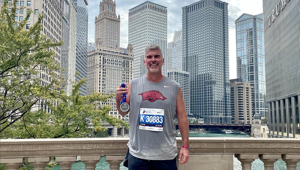
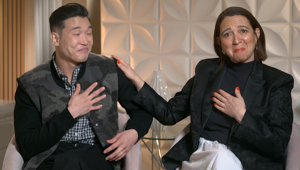







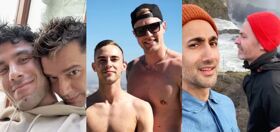

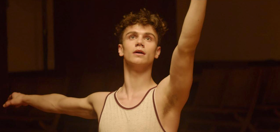
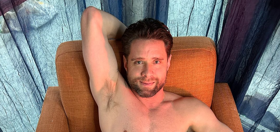
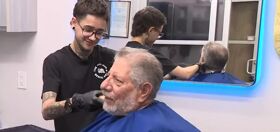
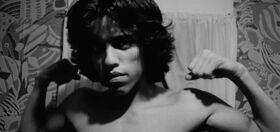
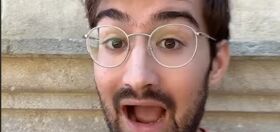

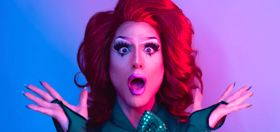
bottom250
Ohhhh my God I love Truth or Dare. I grew up watching it on Netflix. Sweethearts she is so amazing. Every time I watch it, it makes me cry happy tears.
Glücklich
@bottom250:
You seem to cry at the drop of a hat. http://www.pbainfo.org/
—–
Never saw “Truth or Dare.” I did see Julie Brown’s satire of it, “Medusa: Dare to be Truthful.”
https://www.youtube.com/watch?v=xuyYzII32eE
bEWEGUNG
love it…
bottom250
@Glücklich: Honey, Sweetheart I am a sensitive boy and I will not apologize for it. I would rather be a sensitive queen than a closed off butch.
petensfo
This guy seems very astute & graceful about saying, no, when needed. I loved ‘Truth or Dare’ when it came out; it was incredible access to Madonna when she was huge. She still is, of course, but there’s so much more pop-interference these days.
Glücklich
@bottom250:
Don’t apologize for being a sensitive queen. Apologize for being a menopausal woman.
Travis Wellborn
Wonderful interview!!
bottom250
@Glücklich: Lol thank you for the laugh, sweetheart. Big Hugs for you.
ryantbo
They need to re release this in a directors cut AND The Blond Ambition Tour on Blu Ray was never released in the US and I still think it’s her BEST tour
bottom250
@ryantbo: oh sweetheart I agree
Sansacro
@bottom250: Love you Bottom250. You’re fabulous. Don’t ever change!
bottom250
@Sansacro: Thank you sweetheart. Big Hugs for you. I just try to be the best queen I can be.
machuffin
@bottom250: You grew up watching it on Netflix? Are you a toddler? Hasn’t Netflix only been streaming for a few years? I’m not being snarky, it just seems to me you must still be quite young for this to be possible. Like a fetus or newborn.
AtticusBennett
YUP!
i was about 12 years old when i saw it – it was the first time i ever saw two gay guys kissing.
the movie is pretty damn exceptional, and incredibly entertaining. it was also a breakthrough in documentary cinema – it made more money than almost any other documentary ever released, at that time.
a worthy double-feature is the doc “i’m going to tell you a secret” that follows madonna’s Reinvention Tour – another exceptionally shot, highly entertaining look at the workings, onstage and off, of Her Madgesty
Ladbrook
I’ll admit that I was a hardcore Madonna fan when ToD came out, and yes, it’s a superb documentary and definitely captures the “cultural moment” that was Madonna.
That being said, I’d maybe stop short of claiming that it “changed” an entire generation in a truly meaningful way. Stonewall and Anita Bryant changed a generation. HIV destroyed one. Clinton’s sellout with DADT and DOMA sparked the march toward marriage… and the internet killed the local bar scene in over half the country, denying a generation of young LGBTs the great joy of having a “space of our own.”
Let’s just say that Madonna provided the soundtrack… but damn, what a soundtrack! She was the Queen, and she still is.
Bob LaBlah
After all these years what I would love to know is how much of that $30 million did she get. Madonna is no fool. She is a very smart businesswoman and always has money on her mind.
Mikel Mitra-Lear
It made everyone think it was cool & hip to be a bitch and slut…. not much has changed with the core madge
Arconcyyon
Our goood is coletivi the mega STAR DIVA MUSIC TUOR SINGLE MDNA @ Old decada date pass very pass single TUOR DVD CD SHOW BUINESS PAÍS CITY @ No the very success they SHE WOMEM PALCO DVD SHOW Leauge cup DENCE VERY BALÉ AND BALÉ UNISSEX and GAY NO GAY TOP @ They glitter the palco is efeit luz som aundiun music looks potter look the mega single music present is last party mundi hsitory story musical operion the live and life music black single love and love my love MDNA MADONNA MDNA MONEY VERY MONEY SUCEESS @
Wooly
Hardly earthshattering. Something for Madonna to watch in her retirement. If two back up male dancers kissing was transformative, the gay community is truly starved for heros.
lykeitiz
What a great interview! Definitely the unintentional gay-rights film of its time. Mainstream audiences thought they were in for a Madonna concert, which they got, but were also served an unexpected heaping of gay realness.
@Wooly: & @Mikel Mitra-Lear: Your own disdain for Madonna will never change what the majority thinks of this. And if you think 2 backup dancers kissing was they gayest thing about it, then sorry, but you’re a little slow.
bottom250
@machuffin: junior high and high school, sweetheart when watched in on netflix
Glücklich
@Arconcyyon:
“…love MDNA MADONNA MDNA…”
More like love MDMA. Are you having a stroke, like, ALL THE TIME?
Christian Pedraza
Amazing, she sure was a pioneer on gay rights! â¤ï¸
jar
There was a huge boom in gay films in the 80’s that had a huge impact. This film, not so much. The none thing I would give it is that it was a pretty unfiltered view of Madonna’s overweening narcissism. When Warren Beatty (no slouch in the narcissism dept) incredulously states, no cameras? She doesn’t want to exist without cameras, you know what you’re dealing with. Have they run through all of the truly important gay films for this Legends Project that they’re scraping the bottom of this barrel?
ChgoReason
Nope. This film was utter trash. My cousins and I watched it in their basement and it was just stupid, and useless. At the time, in terms of media, I chose John Stamos, Mario Lopez, that black teenager from Family Matters, the cool brother, as my reference points. Even Duck Tales gave better insight on how to go about in social circles.
Robert Wilson
People say Madge was a gay rights pioneer, but no one ever explains what the fuck she DOES.
Random
@Wooly: The passage of time changes perspective but for many gay people in 1991 this WAS a big deal. I was 19 at the time, had just come out and had never actually seen two men kiss in film or on TV. Also, it was the first time I was really aware non-white gay people. 25 years ago, when gay people were featured in pop culture they were invariably white, so to see a star of Madonna’s magnitude hang around with people who looked a bit like me and for her to actively encourage them to ‘express themselves’, played a significant role in helping me find my feet as a gay man.
Random
@Robert Wilson: She openly discussed gay issues, equality and HIV awareness at a time when few other pop stars did. Elton John and George Michael were still in the closet when Madonna was bringing LGBT issues into the mainstream.
jason smeds
Madonna is over-rated. She’s a symptom of gay male projection. Gay men don’t have the courage to be honest or courageous about themselves and thus they seek out women whom they think will do it for them.
Mad Fan 89
I recently re-watched “Truth or Dare/In Bed With MADONNA” & realised how amazing it was for it’s time. Groundbreaking. Shocking. I was so lucky to grow up with this film, seeing Madonna’s world, a world where gay people were just there, like normal. part of the group (outnumbering the straights) A family of people, Gay & Straight, working & living as artists & performers. It was the first time I saw gay men in any real way. The first time I ever saw men kiss. I watched it all the time. Everyone around me was shocked & upset by this film but this world was normal to me, the only place I felt at home, these were my people & the world I wanted to live in. Will love it forever. “Keep people together, keep people together forever & ever.”
SonOfKings
Sadly, Whitney Houston and Amy Winehouse would be alive, well, and prosperous today if they had been more calculating and ruthless like Madonna.
Gregory Tagarao
#RebelHeart #Iconic
Glücklich
@SonOfKings:
It’s a conspiracy. Madonna sent her henchbitches to kill both of them. Only Streisand has a bigger army so she’s safe.
You saw what happened to Britney. And where’s Peaches been lately? They got the horse’s head in their beds.
Better watch out Myley Cyrus and Lady Gaga…all female pop singers who try to be outrageous have Madonna’s targets on their backs.
Cam
To people who keep saying what was the big gay deal about this film, think of it this way.
Modern Family had to be threatened with a Bycott to even consider having the two gay characters share a chaste kiss, and that is today. This mainstream film had a full gay make-out back in the early 90’s
machuffin
@bottom250: Sigh… I guess I got old without realizing it.
Clark35
@jason smeds: Very true.